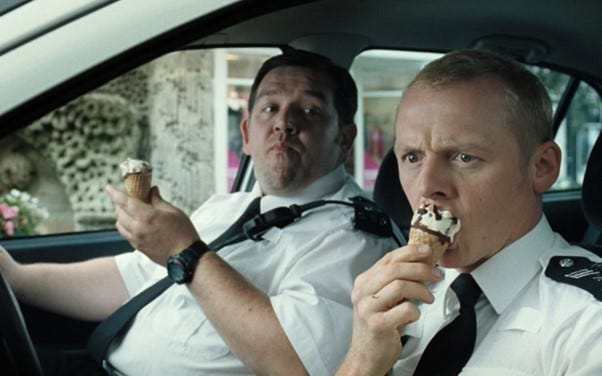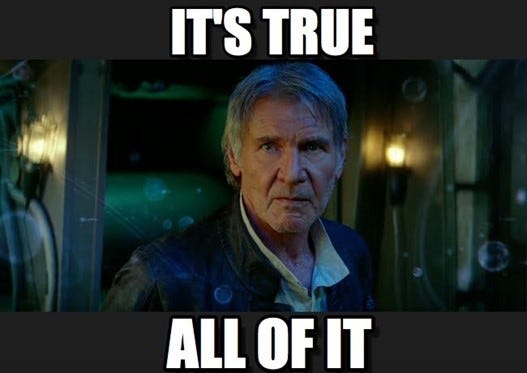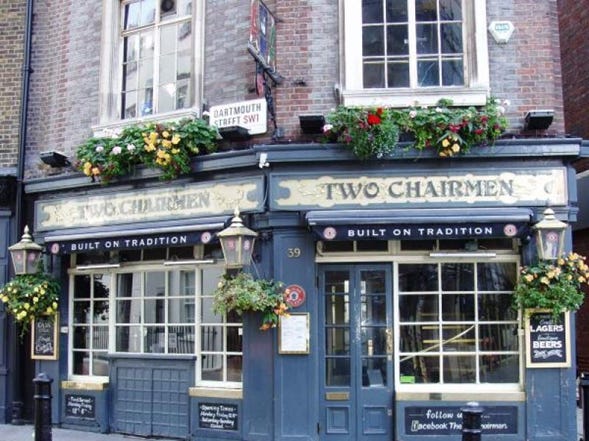All of the food groups are present in a Cornetto, right?
Writing on Substack is an interesting experience. Compared to a novel, which is a long-term project – like an Airfix kit made of words – committing to producing a fairly lengthy essay every week is a challenge. So’s the inspiration for subject matter. The easy way out would be to offer running commentary on contemporary policing.
But how bloody depressing would that be?
I also want to write about Policing’s nooks and corners. The stuff coppers recognise but seldom mention. The ephemera that makes The Job distinctive to people who’ve suffered it. And, yes, about some of the things we did in the past we wouldn’t do now.
So, this week, something different. Inspiration came via two young coppers I saw at Costco. Like modern response officers, they resembled paramilitary dustmen; baggy black-and-dayglo uniforms, their utility belts weighed down with kit. They trudged into the store, a strange look on their pasty, early-turn faces. Was it happiness? Relief? Or anticipation, perhaps?
Why were they in Costco? Was there a shoplifter to be arrested?
No, they were after the Costco £1.50 hotdog deal. This possesses all the elements essential for early-turn sustenance; Carbs. Fat. Mechanically-recovered protein. A taste so wrong it’s… right. Plus a carbonated drink full of sugar. All at an absolute bargain price – which on modern police pay is important. A rebuke to trendy London street food, unsullied by horrors like salad.
Although coppers, who work the streets, were eating street food before that was even A Thing. London’s a World City; I had my first Indonesian breakfast in Brentford in 1994. I was eating Ethiopian food served in a portakabin near Olympia in 1995. I first tried Pide at a Kurdish place in Peckham circa 1998, where it was sold by the metre. London coppers, along with dustmen and posties and anyone else who works funny hours, become food hipsters out of necessity.
In The Job, they call meal breaks ‘Refs.’ And Refs are important when you do a crappy, physical job spent mainly outdoors. So this week, I’m going to talk about the Old Bill’s relationship with food and drink. And, like most police relationships, it has a tendency to veer towards the dysfunctional.
Refs is short for ‘Refreshments’ – the time (if you were lucky) when you took a break for scoff. “Pc 123, you’re early turn on the van, take your refs at 0800.”
“Yes Sarge.”
Refs is, by and large, a uniform term. If you used it in CID (or Special Branch, where I spent eleven years before I became a ‘proper’ detective), people would roll their eyes. Detectives never took Refs. They went for lunch. CID office lunches involved at least four courses in an unpretentious Italian like ‘Ashes to Ashes’. This was years ago and I doubt they have them now. I’m also sure the duty Dc no longer operates a taxi service using the CID car, ferrying drunken detectives across the home counties in the small hours.
Those really were The Good Old Days™
When youngling coppers ask me about Scotland Yard’s drinking culture in the 90s
Refs were taken in the station canteen. None of this eating in public nonsense. An instructor at Hendon told me, “there’s three things the public should never see a copper do; run, sleep or eat. It unsettles ‘em.”
Contrary to popular opinion, the police canteens I remember weren’t like the cantina in ‘Star Wars’ either, despite their reputation as hives of scum and villainy. Although I remember sitting in the smoky canteen at Fulham nick in the early 90s. It was christened the ‘Roy Castle Suite,’ after the popular entertainer who died of cancer caused by passive smoking.
As a young Pc, the canteen was a place of comfort. The council estate I’d patrol on foot for eight hours was full of people who hated me, so the canteen had a womblike appeal. You could also buy a ‘999 Breakfast’ for 2.99. The Met 999 Breakfast was a marvel to behold – a full English artery-assault with toast and tea or coffee. If you were lucky, they’d also serve omelettes to order, usually prepared by a cockney Babushka with a cigarette glued to her lower lip. If you were even luckier, you’d end up with African or Caribbean canteen ladies who’d make homemade curry. I’m sure I’m not the only copper taken to faraway Croydon nick for no other reason than to eat authentic kuku paka.
Yes, the yellow-ceilinged canteen was the beating heart of London police stations. I remember the smell – cigarettes, coffee, dead mice and stale cooking fat. Visiting coppers would sit in corners, scrawling notes, tables littered with plastic evidence bags full of contraband. Mullet-wearing detectives from surveillance teams or crime squads would sit in corners scowling, waiting for something to happen. Van drivers would huddle around their dedicated table, playing cards and drinking tea from styrofoam cups with their shoulder numbers scrawled on in biro.
Some Met canteens were huge – Paddington and Charing Cross were open 24/7. Some were small – Ealing and Notting Hill spring to mind. Then, after they opened the PPP stations in the 2000s they began to resemble any other corporate workplace (the super-nick at Sutton, right? Horrible canteen).
Then they closed the canteens and sold most of the police stations. The management tried to spin what was a naked cost-saving measure into an opportunity; go and eat in the community, they said! Make friends with your customers, they said!
How did that work out?
Then there was Night Duty. 22.00 – 06.00. Most police canteens were closed, so hungry coppers were left to their own devices. This meant takeaway food (unless you were one of those weirdos who brought in a Tupperware box of salad), although there were rules;
1. We preferred establishments known to be ‘GTP’ or ‘Good to Police’, i.e. they offered a discount to Old Bill. Whether this is naughty or not is open to debate, as a discount offered to all coppers isn’t technically a gratuity.
2. You only used places where you could witness the food being prepared. People don’t like the police and never will. They WILL put horrible things in your meal. I heard recently of young coppers dialling out for pizza to be delivered to their patrol base. Rookie error, kids. Rookie error!
3. If you found somewhere especially good then you kept it secret. Cops are like locusts when they know something’s available at a discount. They WILL ruin it for everyone else. This is why we can’t have nice things.
I’m about to break Rule 3, to say thanks for reading my stuff. There’s a certain kebab shop near Waterloo Station which is quite obviously excellent. Why? There are usually police carriers and black cabs parked outside. This is a surefire indicator of a decent place to eat on a budget. An honourable mention also goes to the bagel shop just off the Gants Hill roundabout.
You are very welcome.
The Capital Kebab is five-star Adler approved, one day they will put a blue plaque on the wall saying I ate here while pretending to be on an enquiry
In summertime we’d have night duty barbeques in the station yard. Each callsign would be given a ‘mumping’ objective. Mumping means begging or borrowing for supplies using trusted GTP contacts. One car would be sent to get briquettes for the barbie. Others would visit the all-night bakery for rolls. Advanced operatives might know of a 24/7 Halal butcher prepared to offer up fresh meat for a discount. We’d stand in the moonlit yard scoffing charred lamb rolls, listening to our radios for when the nightclubs chucked out. We’d go and fight drunks and try not to puke.
The other food ritual I remember was Cake. Cake, in the UK police service, is a form of currency. Fines for transgressions are paid for in the stuff – the more serious the crime the more fancy the patisserie. For example, crashing a police car? A walk of shame to a proper bakery to buy a big old tray of cream cakes. Being twenty minutes late for work? A couple of bags of fresh Tesco donuts will do. I’ve seen formal lists covered in fablon, listing every possible transgression and the resulting cake fine.
There’s a thought; given the state the Met’s in right now, perhaps it’s time to buy shares in Greggs.
Although nowadays, making people buy cake is seen as a form of bullying and is frowned upon. There’s nowhere the morale vampires haven’t sunk their fangs. I do wonder, though, if there’s a connection between a joyless, politically-correct police service and the amount of wrongdoing it generates?
Then there was booze. Jesus Christ, there was booze! Who’d imagine a high-pressure job involving occasional violence, life-changing decision-making, strange hours, 24/7 scrutiny and exposure to the worst people humanity has to offer might drive someone to drink? I’m not making light of alcoholism, something I’ve seen blight too many lives – including many police officers’. I’ve seen the bottle of Scotch in the DI’s bottom drawer for real. I’ve lost good friends to the bottle.
The Sweeney – art imitating life
Yet I’d be lying if I said I didn’t enjoy aspects of the culture - which is why booze is so dangerous. Although I’ve never laughed as much as I have in the company of coppers on the piss. Fun fact; when the Met was established in September 1829, its first ever officer was quickly dismissed for drunkenness.
The first time I ever had a drink on duty was with an avuncular crime prevention officer. I was a probationer, doing my statutory round-robin tour of the different jobs at the station. In this instance, the CPO’s appointment was at a boozer. The landlord, an Irishman (Ireland produces, in my experience, some of London’s finest licensees), immediately poured him a pint. “What will you be having, son?” he asked me. I immediately thought of Hendon’s warnings about the perils of drinking on duty, feeling like a newly-ordained priest offered a snog from a barmaid.
“It’s okay,” said the crime prevention bloke with a wink. “It’s only one pint and you’re in plain clothes.”
Seven pints of London Pride later, after a brief discussion about burglar alarms and the benefits of growing rose bushes to deter burglars, I was listening to the landlord telling funny stories about the farm he grew up on in Offaly. He also named two local lads flogging dodgy stereo equipment in the snug every Thursday. Then he told us which local boozers were struggling to get rid of some coke dealers, even revealing the colour and model of car they drove. After we staggered back to the nick, the CPO wrote down the intelligence we’d garnered for the divisional Collator.
Pubs and coppers. Like beef and mustard, really. There’s a whole article to be had on the subject of pubs and coppers, which I might even write. I can honestly say I’ve done some pretty decent police work in boozers.
The Squad office, circa 1998
About five years later, as a young special branch officer, my DS took me to the pub for my annual appraisal. We worked hard and occasionally took a drink. It’s just the way it was. No food, though – as the Job saying goes when on the piss, eating’s cheating.
The pub was The Two Chairman, I recall, a Branch haunt when New Scotland Yard was still on Broadway opposite St James’ Park station. Over a pint of Guinness, my DS listed my faults (you have a tendency to be disputatious, he said). At this point a VERY senior police officer sauntered into the pub with a distinguished-looking chap. I won’t say who the senior officer was, as he’s a decent bloke of the variety they don’t make anymore. If you were in Met SB, though, send me a message and I might tell you. I suppose you’ve guessed already, right?
Oh fuck, I thought. It wasn’t even noon.
The Very Senior Officer wandered over. Like many impressive seniors, he knew everyone’s name. “Ah, Thomas,” he said to my DS. “And Dominic? How are you?”
“We’re good,” my DS replied, wiping Guinness foam from his top lip. “I’m just doing Dom’s appraisal.”
The Very Senior Officer raised an eyebrow. “Of course you are,” he replied, turning to the other bloke. “This is Mister Smith, from the Home Office.” A spook, then, I figured.
“Good to meet you, Sir,” I said.
“Now,” said the Very Senior Officer, as Mister Smith wandered off to the gents. “Why don’t you buy us both a large gin and tonic? We’ll join you for a drink, then you can bugger off back to work, eh?”
“Will do,” said my DS.
“Good,” the VSO replied, smiling pleasantly. Then, a wink. “Really, there’s no rush.”
Those really were the days. It was fun and we’d follow that boss off a cliff if he asked. Different world, different rules. It certainly wasn’t like that by the time I left - the only reason I’d follow a senior now would be out of idle curiosity. Yes, I definitely preferred the old school.
So sláinte. Mazel tov. Skol. And, if you’re asking, mine’s a Guinness. And I’m still proudly disputatious.







Like me, you have run the gamut of uniform and CID, Special Branch and DPS, just 15 years apart. With very minor differences, 'Refs 'could have been written about my own experiences! Like society in general, I think the Met stayed broadly the same from post WWII to the millennium. After M2K, Britain in genera,l and the Met in particular, had too many twat's in charge who were there for all the wrong reasons. 'Refs' beautifully encapsulates everything that was enjoyable about being a Met copper,, before the bastards fined it.
Dom, my belly is aching from the laughing, thanks again for another opportunity to snigger on a dull and dreary January afternoon!
The Two Chairmen is still a great little boozer. I was in there after the Remembrance parade last year for the customary Guiness brunch!